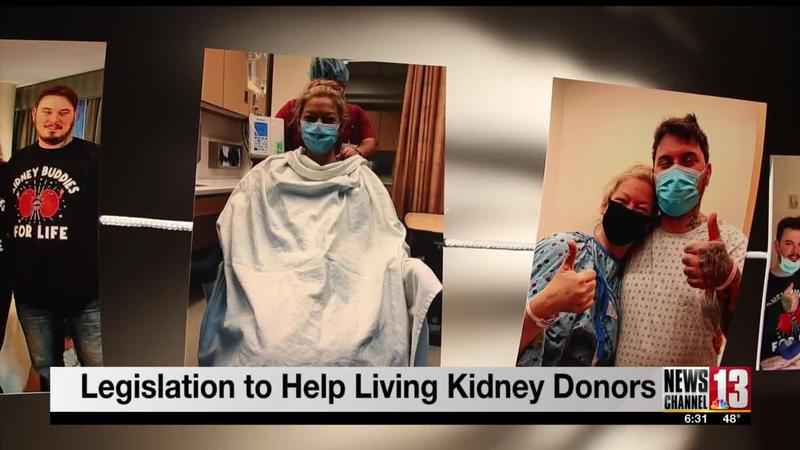Legislation looks to increase number of living kidney donors
[anvplayer video=”5104119″ station=”998132″]
New York State has more than 7,000 people waiting for kidney transplants. While people may be an organ donor after life, the need for living donors is high.
Robin Pinto from the Capital Region was able to receive the gift of life twice.
“The gift of life I received from my husband and son-in-law has allowed me to think about a future and be a grandmother,” explained Pinto.
About 20 years ago, she was diagnosed with IgA nephropathy. It’s a disease where your autoimmune system attacks your kidneys. She got her first kidney transplant in February 2009. Her husband donated one of his kidneys.
“He just knew in his heart from day one when I was sick he was going to be the donor and sure enough he was a 4 DNA marker match, and he was a perfect match for me,” said Pinto.

Robin’s husband John said the procedure was quick, and he has had no problem living with one kidney.
“I was home maybe four weeks at the most,” explained John.
Pinto then started having issues with her transplant in 2021. She got her second transplant this past February. This time she received a kidney from her son-in-law. While he was a perfect match, the planning of this transplant was more complicated.
“They had just moved back from Vermont, he was new at a job with no vacation time and no paid leave, no PTO to use, and he was my match,” explained Pinto. “So we were faced with now what do we do.”
It’s something a lot of recipients and donors are faced with. Either save up or save a life.
“It really is a significant burden for the donor, and it should never be like that, because when you’re looking at organ donation it is the gift of life and there is no greater gift than the gift of life,” said Pinto.
The goal of a bill in the New York State Legislature aims to take that burden off the donor. The New York State Living Donor Support Act provides state reimbursement to living organ donors, who are state residents, for medical and associated expenses incurred as a result of organ donation, when the organ donation is made to another resident of the state.
“It’s a lengthy process to get approved, doctors’ appointments and visits, and you have to be able to get there and take time off work,” explained the CEO and President of the Northeast Kidney Foundation Melissa Mantei. “These bills would really help provide an opportunity to give more people a chance to get involved."
Mantei said people wait on average of 3 to 5 years on the transplant list to get a kidney. She donated a kidney to a stranger nearly 14 years ago.
“It’s critically important to have living donors,” explained Mantei. “Not only because it increases the donor pool, but a living donation actually increases your chance for the person to receive that kidney and take to it better than a deceased cadaver.”
There’s another bill looking to incentivize people to be living donors. It would provide lifetime, premium-free insurance through the New York State of Health Marketplace. It establishes the Kidney Donor Insurance Fund. Assemblyman Angelo Santabarbara is a sponsor.
“More than a decade ago Israel began a program like this, with an insurance fund and the donations did increase 64 percent that following year,” said Santabarbara.
He added there is no real opposition to the bill, but perhaps a lack of awareness about the problem.
“Establishing this fund, having the state manage it, there is work involved in doing that so having a commitment to do that, but it’s a commitment to save lives,” explained Santabarbara.
Both of the bills are still in committee. Even if the bills don’t get out of committee before the end of the legislative session, Pinto is just happy to see the conversation starting.
“I think it will tremendously impact the number of people who will say yes I will donate an organ, yes I will reach out and save a life whether it’s someone they know or a total stranger,” said Pinto.
To learn more about becoming a living kidney donor, click here.
To learn more about the 2022 Albany Kidney Walk & Run hosted by the Northeast Kidney Foundation, click here.